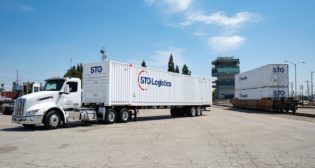
Gulf Coast Service? Not So Fast, Say CSX, NS
Written by Marybeth Luczak, Executive Editor
In late February, Amtrak confirmed its intention to begin service between New Orleans and Mobile in 2022. But a stakeholder agreement had not yet been reached.
“Unripe.” That is what CSX and Norfolk Southern (NS) have called Amtrak’s application with the Surface Transportation Board (STB) asking for an order requiring the freight railroads to permit access for twice daily round-trip passenger service between New Orleans and Mobile, starting on or about Jan. 1, 2022.
In their April 5 STB filing, CSX and NS called for the dismissal of Amtrak’s application for these reasons:
“First, Amtrak asks the Board to rule on a dispute that is not ripe because (1)” CSX and NS “have not refused to accommodate Amtrak’s proposed service—they have simply asked Amtrak to live up to the commitments it made to complete a joint Rail Traffic Controller (‘RTC’) modeling study to determine the infrastructure that will be required to support such service and (2) Amtrak lacks important state support to ensure success.
“Second, Amtrak asks that the Board take major federal actions with significant environmental consequences, but it fails to submit an Environmental and Historic Report as required by 49 C.F.R. Part 1105.
“Third, Congress did not give Amtrak any cause of action that could support its extraordinary demand for an ‘interim order’ allowing Amtrak to enter other railroads’ lines to perform ‘preparations’ for new service before the Board issues any decision on whether the new service will be allowed.”
The railroads concluded that they “respectfully request that the Board dismiss without prejudice Amtrak’s Application as unripe and procedurally deficient. CSXT [CSX] and NSR [NS] have not refused the proposed Gulf Coast passenger service as required for jurisdiction under § 24308(e), Amtrak lacks the support of key stakeholders, and the Application does not include the requisite Environmental and Historic Report. Alternatively, CSXT and NSR ask that the Board hold Amtrak’s Application in abeyance for as long as Amtrak requires to address these deficiencies. And Amtrak’s request for an interim order for access to CSXT and NSR’s rail lines to begin preparation work for the proposed Gulf Coast service is contrary to law and should be denied with prejudice.”
Amtrak released the following statement to Railway Age on the railroads’ motion to dismiss: “The matter is before the proper authority, the U.S. Surface Transportation Board, where we fully anticipate the STB’s process will be both transparent and data driven. We will respond to all filings through that docket.”
What Prompted These Moves?
Railway Age reported the three began an Amtrak-funded study in 2020 using Berkeley Simulation Software’s Rail Traffic Controller modeling program to determine passenger rail’s impact to existing freight traffic.
The parties’ one-year agreement expired in January 2021, Amtrak spokesman Marc Magliari noted in late February. “Something that should have taken seven months was far from completion after a year,” he said then in a statement to Railway Age. “In fact, discussions have been under way for five years. There was no sign of any conclusion in sight.”
Magliari also said that Amtrak had notified the host freight railroads of its intention to start service, and asked them “where they believe there are more issues. We safely and successfully operate together elsewhere in the United States, with dependable freight service coexisting with reliable and relevant Amtrak service. That’s what the Gulf Coast deserves, too.”

Advocates and legislators weighed in with statements of support. They included the Southern Rail Commission; U.S. Senator Roger Wicker (R-Miss.), Ranking Member of the Senate Committee on Commerce, Science, and Transportation; the Rail Passengers Association; and Transportation for America.
More recently, in STB filings, others have expressed reservations about initiating passenger service before a study is completed. Among them are the Alabama State Port Authority and Alabama Gov. Kay Ivey.

Gov. Ivey wrote, in part:
“It has been brought to my attention that Amtrak filed an application with the Surface Transportation Board (STB) seeking an order to restore passenger service along the Gulf Coast between New Orleans, Louisiana and Mobile, Alabama. On behalf of the State of Alabama, I would urge the STB to require Amtrak to complete a study of the impacts of this service before it considers Amtrak’s application.
“Alabama businesses and important transportation hubs like the Port of Mobile depend upon reliable and safe freight service over the lines on which Amtrak proposes to operate. It is important for all stakeholders to understand the impact of Amtrak’s proposal and to determine what additional infrastructure might be required to avoid negative impacts of the proposed new service.
“For several years, Alabama has withheld funding for new Gulf Coast passenger service because of our concern that any economic benefit from new passenger rail service will be outweighed by the potential harm to freight rail service based on the current infrastructure. I am particularly concerned about the impact to the Port of Mobile, which has been critical to Alabama’s substantial growth in exports in recent years.
“An operational modeling study is needed to adequately understand the impact of new Gulf Coast passenger service on freight rail traffic. This study will help to identify what additional infrastructure may be necessary to support passenger service while both preserving the existing level and quality of freight service and accommodating the anticipated growth of freight movement through the Port of Mobile and the region more broadly. This information is also critical to understanding Alabama’s long-term financial commitments in connection with this passenger service.
“I understand that Amtrak recently refused to renew a joint agreement with CSX and Norfolk Southern for a comprehensive modeling study that was close to being finished. The STB should not allow Amtrak to restore service until that study has been completed. Without a completed operational modeling study, Alabama will not commit to providing any financial support to new Gulf Coast passenger service.”

On behalf of the Port Authority, Director and CEO John C. Driscoll wrote, in part:
“The Port Authority fundamentally does not oppose passenger rail into the City of Mobile, but we do have deep concerns regarding Amtrak’s impact on servicing current freight rail as well as servicing future freight capacity demand in the CSX corridor. Since Amtrak left the corridor in 2005 [following Hurricane Katrina], over $1.3 billion has been invested in the rail served public seaport terminals and related transportation infrastructure at the Port of Mobile. Currently, there is over $700 million in active or planned waterborne or surface transportation infrastructure projects to support shipper needs at Port of Mobile.
“Our railroad, the Terminal Railway (TASD), services all railed freight and container intermodal volumes in and out of the port’s public terminals, as well as provides switching services between eight railroads using the seaport. We are knowledgeable of the corridor’s attributes and limitations and fear priority access for passenger rail without proper study or investment would degrade freight rail service, generate unmanageable levels of congestion, and adversely affect shipper transportation cost metrics and their market competitiveness.
“To address our concerns, we strongly urged Amtrak to conduct the necessary operational modeling and corridor capacity assessments prior to initiating new service on the primarily single-track CSX corridor. Further, the State of Alabama and the City of Mobile funding for the passenger rail service was conditional to the completion of that study. In January 2020, Amtrak initiated that study, in cooperation with the CSX and the Norfolk Southern. In January 2021, Amtrak refused to extend that study to complete that work and then petitioned the Surface Transportation Board (STB) to compel host railroads to provide access. Amtrak’s STB petition deprives our seaport, our shippers and our freight railroads of appropriate assessments to preserve the safety and reliability of freight rail service at one of the nation’s larger seaports.
“The Alabama State Port Authority think it imperative that Amtrak return to the table to complete the modeling study along with infrastructure and cost assessments to support passenger rail without degrading freight service or safety.”



